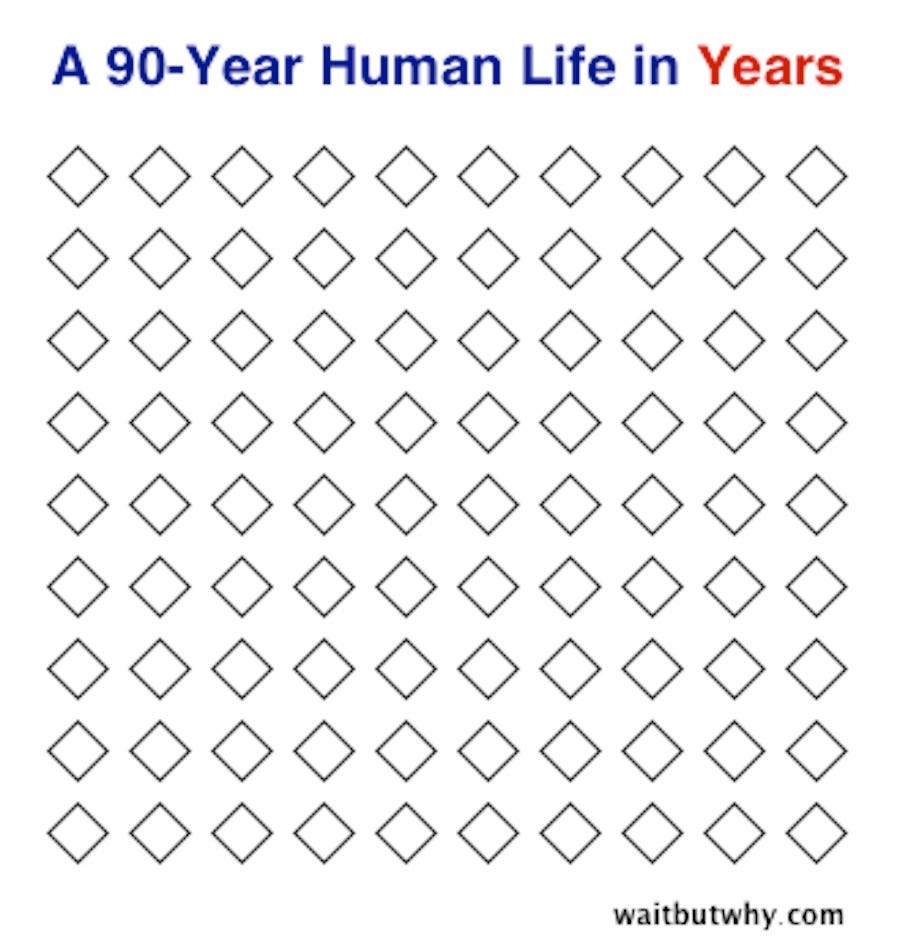If You Don’t Want To Regret Your Life 30 Years Later, Make This One Choice Right Now
Author’s Note: This article was written over 60 hours with love and care using the blockbuster mental model.
Definition Of Hell: “On your last day on earth, the person you became will meet the person you could have become.”—Unknown
By the time you move out of your parents’ home, you’ve already spent 93% of the time that you will ever spend with them (if they live far away).
Conversely, as a parent, you will only see your kids a handful of times per year once they move out.
Our career is just 80,000 hours. There are only one or two things we can become truly world-class at if we go all out.
Tim Urban beautifully captures the shortness of life in this graphic:

Each diamond is one year. One winter filled with sledding and building snowmen. One spring full of flowers. One summer for enjoying the beach. One fall’s worth of rainbow-colored leaves. One loop around the sun.
I remember being in high school and trying to fathom what it would be like to have kids. Now, I have a 7-year-old and a 9-year-old running around the house. Fast-forward another 18 years, and I will be in the second half of my career and my kids will be out of the house. Maybe they’ll be reflecting on the shortness of life like I am now.
Every second, every minute, every hour, every day, every year is precious!
All of this brings us to the one ultimate and timeless question:
How do I live my life NOW so that I have no regrets on my deathbed?
One of the most brilliant and wise answers to this question that I’ve ever seen comes from a TED Talk delivered by a world-renowned Harvard Professor called How Will You Measure Your Life? The talk came after a time of intense personal reflection after Christensen had overcome the same type of cancer that had taken his father’s life. It particularly speaks to high achievers.
Here is the most inspiring part:
I graduated from the MBA program at Harvard in 1979… When we came back for our 5th reunion, man, everyone was happy! Most of my classmates had married people who were much better looking… they were doing well in their career. But as we hit the 10th, and 15th, and 20th and then the 25th anniversaries, oh my gosh, my friends were coming back not happy with their lives. Very many of them had gotten divorced. Their spouses had remarried, and they were raising my classmates’ children on the other side of the country, alienated from them.
And, I guarantee, that none of my classmates ever planned when they graduated from the business school to get divorced, and have children who hate their guts and are being raised by other [people]. And yet a very large proportion of my classmates implemented a strategy that they had never planned to do.
And it turns out that the reason why they do that is the very same mechanism; that is the pursuit of achievement. Everyone here is driven to achieve. And when you have an extra ounce of energy or an extra 30 minutes of time, instinctively and unconsciously you’ll allocate it to whatever activities in your life give you the most immediate evidence of achievement. And our careers provide that most immediate evidence of achievement. We close a sale. We ship a product. We finish a presentation. We close a deal. We get promoted. We get paid. And our careers provide very tangible, immediate achievement.
In contrast, investments in our families don’t pay off for a very long time. In fact, on a day-to-day basis, our children misbehave over and over again. And, it really isn’t until 20 years down the road that you can look at your children and be able to put your hands on your hips and say, “We raised great children!” But on a day-to-day basis, achievement isn’t at hand when we invest in relationships with our families, our children, and our spouses. And, as a consequence, people like you and I, who plan to have a happy life, because our families truly are the deepest source of happiness in our lives, find that though although that’s what we want, the way we invest our time, our energy, and talents causes us to implement a strategy we wouldn’t at all plan to pursue.
Christensen then goes on to share how maximizing the short-term over the long-term relates to his widely known theory on disruptive innovation:
The reason why successful companies fail is that they invest in things that provide the most immediate and tangible evidence of achievement. And the reason why they have such a short time horizon is that they are run by people like you and I [people focused on achievement].
Christensen applies this theory to family and business disruption, and I’d make the case that it applies much more widely. Here are a few examples…
The leading causes of early death in the United States are linked to poor lifestyle. No one plans to die early, yet so many aren’t willing to eat healthy or exercise daily: things that are difficult to do in the short-term.
No one plans to go on unemployment or become obsolete in the workforce, yet so many aren’t willing to make deliberate learning a core part of their daily schedule, because it doesn’t provide an immediate sign of achievement.
No one plans to lead a life of chronic stress, but taking time for play or renewal can feel like a waste of time.
So, how do we change from thinking short-term to thinking long-term and reaping the benefits of the latter as a result?
The solution lies within understanding a key principle, compound time, something that successful people like Warren Buffett, Oprah, Ray Dalio, Einstein, and Thomas Edison use.


